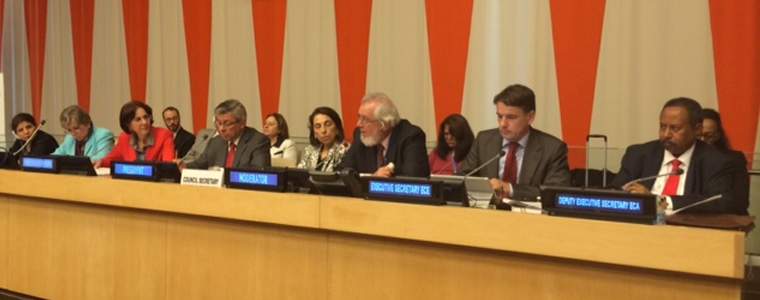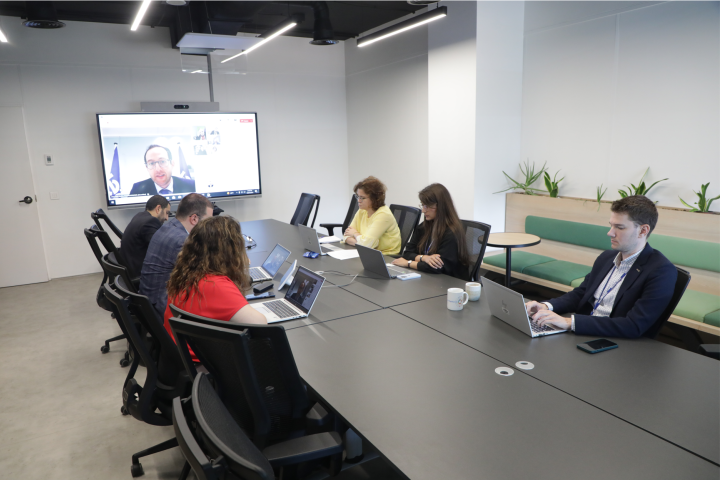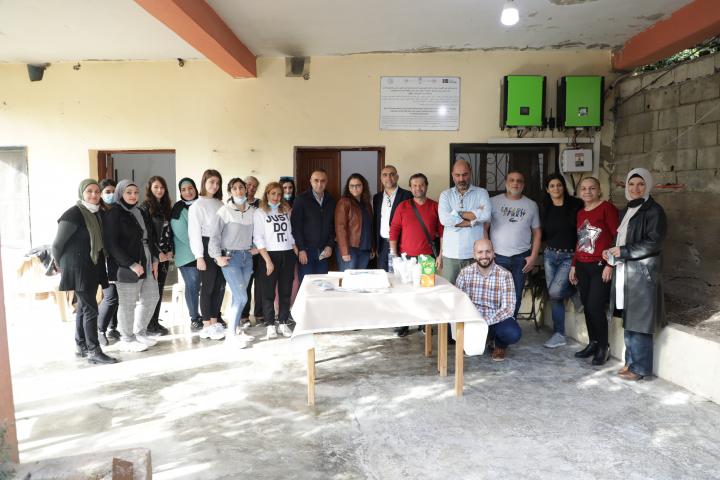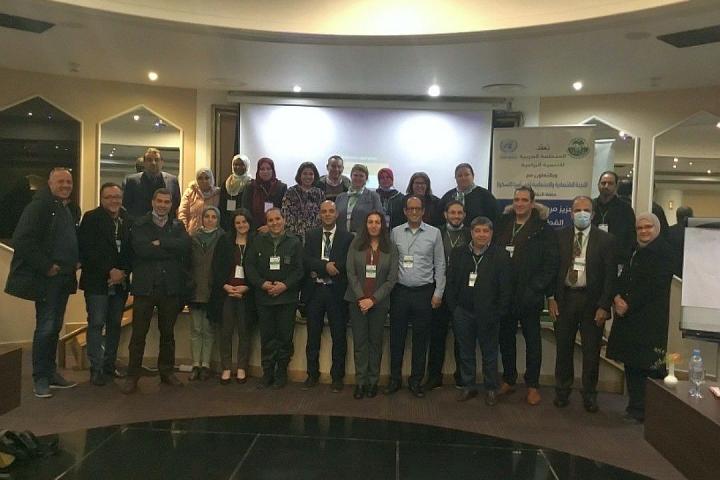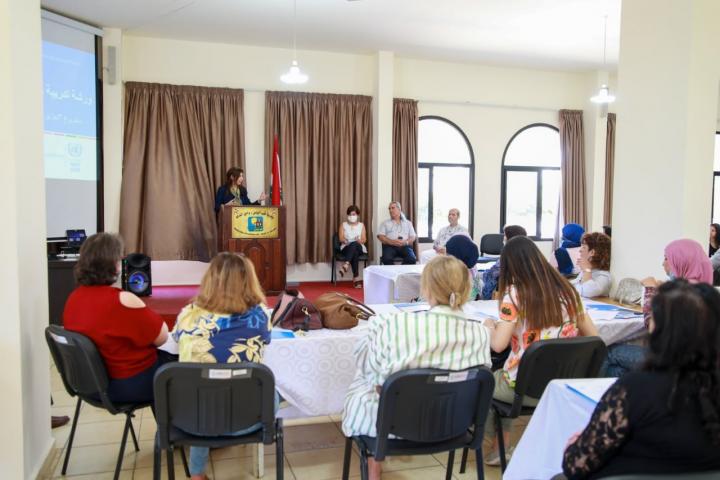The ministerial segment of the High-level Political Forum on Sustainable Development was held under the auspices of the United Nations Economic and Social Council (ECOSOC), during the high-level segment of its 2015 session that took place from 6 to 10 July 2015 at the United Nations Headquarters in New York. The session addressed the transition from the Millennium Development Goals (MDGs) to the sustainable development goals (SDGs) and also included the annual Dialogue of the Executive Secretaries of the United Nations Regional Commissions which focused on the theme Managing the transition to the SDGs: What will it take at the regional level?
A nexus approach to regional integration for the achievement of sustainable development
In her statement at the annual Dialogue, Ms. Rima Khalaf, Under-Secretary-General and Executive Secretary of ESCWA, stressed the importance of regional integration in achieving sustainable development. She said that the Commission had adopted a nexus approach to integration, taking into account that the SDGs were interlinked and that development outcomes were determined not only by domestic policies, but increasingly by regional and global environments. She explained that full integration could be achieved by establishing a dynamic, comprehensive development framework that captured the interrelationships between different sectors of the economy and the impact of regional and global environments on the economic variables of a given country and its ability to achieve the SDGs.
Ms. Khalaf indicated that ESCWA had developed models and analytical tools to help member States address the following cross-cutting challenges: the water-energy-food nexus, by helping Governments deliver on resource efficiency and access to energy while safeguarding rights to water and food; the growth-employment-social protection nexus, by devising policies focused on employment so as to reduce inequality and achieve social security; and the conflict-development nexus, by providing a platform for dialogue between the various parties and offering technical support to facilitate transition from protracted conflict to peace. She noted that ESCWA had devised an ambitious, comprehensive national agenda for the post-conflict political, economic, social and environmental reconstruction of Syria and similar agendas were in the pipeline for Libya and Yemen.
The Executive Secretary emphasized that “success will hinge on our ability to think in an integrated manner. In order to succeed, we need to think together. To deliver as one, we need to think as one."
Equity, social justice and the rule of law across the SDGs
In a panel discussion entitled Equity, social justice and the rule of law across the SDGs, organized within the ECOSOC event by the International Development Law Organization (IDLO), Ms. Rima Khalaf delivered a keynote speech in which she highlighted the plight of the Arab region as a result of injustice and the absence of the rule of law. She said that more than 24 million displaced people were from the Arab region, almost half the global total. More than a quarter of a million had lost their lives there over the past four years alone as a result of armed conflicts. She underlined the cost of lawlessness and its devastating repercussions. The fighting in Iraq, Libya, Syria and Yemen was not only creating incalculable suffering at home, but also shockwaves that were destabilizing neighbours and alarming countries across the world.
In Syria, the conflict had plunged development in the country to levels not seen since the last century.
In Palestine, international complacency had not only allowed the grinding Israeli occupation to continue for half a century, but had also propagated instability across the region.
The Executive Secretary stressed the need to address the causes of injustice at the national and the international levels. It was the responsibility of States themselves to reform flawed constitutions and laws, end discriminatory practices that marginalize large segments of the population, implement participatory processes, ensure the full respect of fundamental rights and freedoms, establish accountable Governments and build economic foundations to sustain inclusive growth. At the global level, Ms. Khalaf said that international norms may be unjust, flouted or unfairly applied. She wondered what other explanation could be given for a system that allowed over $1.2 trillion, stolen over the past 30 years from Africa's children, to sit safely in Western banks, that turned a blind eye to genocide in Africa, or that threatened the victims of occupation in Palestine with the harshest measures if they decided to take their grievances to a court of law.
She concluded that global norms could be made more just by referring to the United Nations Charter and the Universal Declaration of Human Rights, which remained the guide for reforming the global system despite having been penned after the Second World War.
Monitoring and follow-up in the post-2015 era
The League of Arab States: Platform for Follow-up and Review to Ensure the Achievement of Sustainable Development Goals in the Arab Region, was the title of an Arab joint side event organized by ESCWA in cooperation with the League of Arab States, the United Nations Environment Programme (UNEP), and the United Nations Development Programme (UNDP)/Regional Bureau for Arab States. The aim was to discuss the Arab regional institutional framework for sustainable development monitoring and follow-up in the post-2015 era; review the League's existing processes and structures as mechanisms for integration and for SDGs coordination, implementation, follow-up and review in the Arab Region; and present the main outcomes of the Arab Forum on Sustainable Development, held in Manama, from 5 to 7 May 2015.
Ms. Rima Khalaf delivered a statement in which she noted that the current situation in the Arab region was not the result of reform shortcomings but of unsuccessful numerous reform attempts. She stressed the relevance of the global development agenda which could be a valuable opportunity to deliver the Arab region from a development impasse if follow-up and review mechanisms were established. ESCWA had developed, in cooperation with the League of Arab States an Arab regional perspective on sustainable development priorities, such as establishing good governance, building efficient institutions, ensuring broad participation of all stakeholders, and harmonizing the SDGs with the challenges and aspirations of
Arab States.
Many questions remain unanswered, however, on ways to transform the post-2015 plan into feasible programmes. Ms. Khalaf explained that, while the national follow-up and review mechanisms were clearly requiring accountable Governments, the regional ones remained unclear with regard to the party which should be subject to follow-up and the party in charge of it; the role of the regional organizations in the joint command of the review; the regional indicators to be used; and the required capacity-building and partnerships.
The Executive Secretary expressed her hope for continual cooperation with member States, the League of Arab States and other partners to achieve the well-being of the people of the region.
Picture Source: http://bit.ly/1gDA9e8
